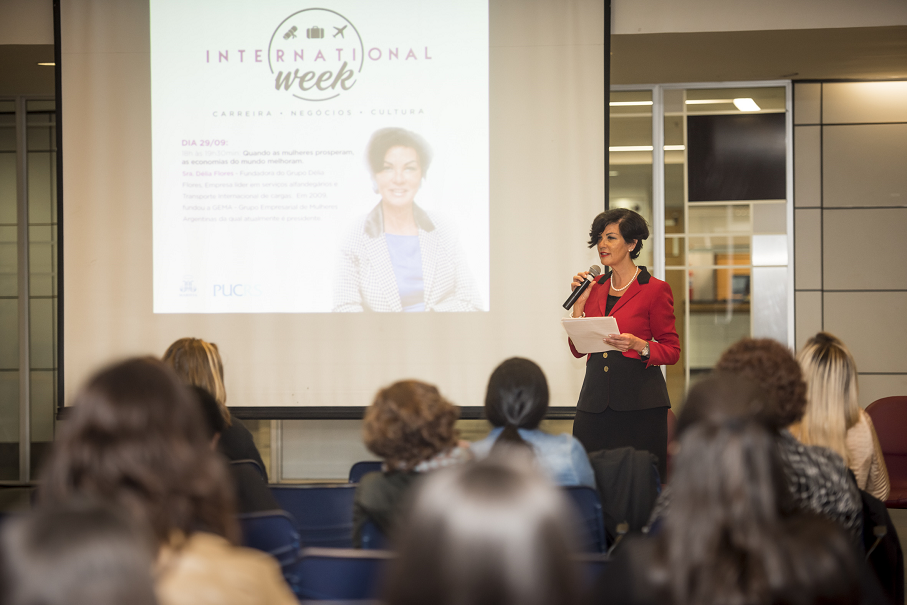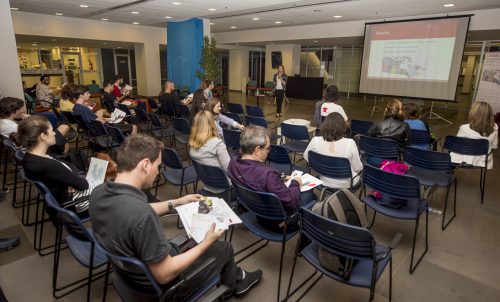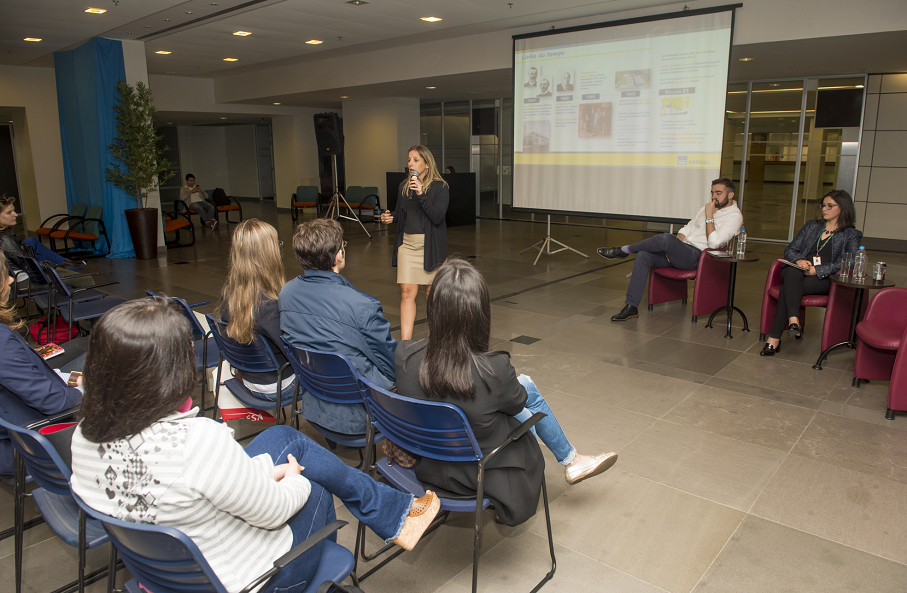Research and study opportunities in Canada, France, Germany and Netherlands among topics of discussion
 From Sept 25 – 29, PUCRS promoted the International Week, an event that brought both local and international students to learn about research, study opportunities and exchanges abroad, in countries such as Canada, France, Germany and the Netherlands. Paula Manozzo, official representative of the Canadian Office in Brazil, and Juliana Torres, Alumni Canada Brasil’s Vice Director of Social Media, talked about multiculturality, quality of life, encouragement to research, student benefits and receptivity to immigrants.
From Sept 25 – 29, PUCRS promoted the International Week, an event that brought both local and international students to learn about research, study opportunities and exchanges abroad, in countries such as Canada, France, Germany and the Netherlands. Paula Manozzo, official representative of the Canadian Office in Brazil, and Juliana Torres, Alumni Canada Brasil’s Vice Director of Social Media, talked about multiculturality, quality of life, encouragement to research, student benefits and receptivity to immigrants.
“Canada is much more similar to Brazil than we can imagine”, said Paula Manozzo. Among the most striking similarities, she mentioned the diversity of the peoples and the size of the countries. “Brazil is the 5th largest country in the world, whereas Canada is the 2nd. The difference is that the number of Canadians is much smaller: around 35 million people. This makes them very open to immigration”, explained she. Paula added that Canada was the first country to enforce a multiculturalism act, which is celebrated all over the nation.
 The entrepreneurship of the Canadian people was another topic addressed. “Many companies originated there, including those that designed interactive e-boards, IMAX movie theaters and BlackBerry, which was born at the University of Waterloo”, claimed Paula. She went on to say that the following areas are in evidence in the country: business administration, engineering and technology, IT, digital medias, sciences and biotechnology. “Canada is one of the countries that heavily invests in higher education. Institutions are highly valued and so is research”, concluded she.
The entrepreneurship of the Canadian people was another topic addressed. “Many companies originated there, including those that designed interactive e-boards, IMAX movie theaters and BlackBerry, which was born at the University of Waterloo”, claimed Paula. She went on to say that the following areas are in evidence in the country: business administration, engineering and technology, IT, digital medias, sciences and biotechnology. “Canada is one of the countries that heavily invests in higher education. Institutions are highly valued and so is research”, concluded she.
In Torres’ view, there are three paths to tread if one wants to study and get scholarships in Canada: language programs, universities and colleges, offering courses similar to technology degrees, which are more career-oriented, and are usually shorter. Scholarships are awarded by the universities per se, research institutes or by the government. One of the most wide-ranging scholarships is the Emerging Leaders of the Americas Program (ELAP), an academic mobility program offered by PUCRS’ Office of International Affairs (AAII).
 Another highlight of the session was the closing lecture When women thrive, world economies revive. Argentinean businesswoman Delia Flores, founder of the leading company in customs services and international cargo transportation Grupo Delia Flores, and GEMA – Business Group of Argentinean Women, of which she serves as president, took the stage to talk about the relationship between women and the economy.
Another highlight of the session was the closing lecture When women thrive, world economies revive. Argentinean businesswoman Delia Flores, founder of the leading company in customs services and international cargo transportation Grupo Delia Flores, and GEMA – Business Group of Argentinean Women, of which she serves as president, took the stage to talk about the relationship between women and the economy.
As she told the stories of her life, the audience could testify how closely related the lecture was to her testimonials. “We need to bring women closer to financial tools. Women in the job market can get the GDP to grow up to 10%”, said she, as she described the reality of her company. “In 2016, 45% of workers were women. Out of that number, less than 20% served as directors. We need to encourage inclusion of women, contribute to the growth of women in top positions in companies”, claimed she. At the end, she urged females in the room to take the job market. The meeting came to a close with a tango performance, led by Dorgel Silva and Rita Zanini, PUCRS’ alumni.